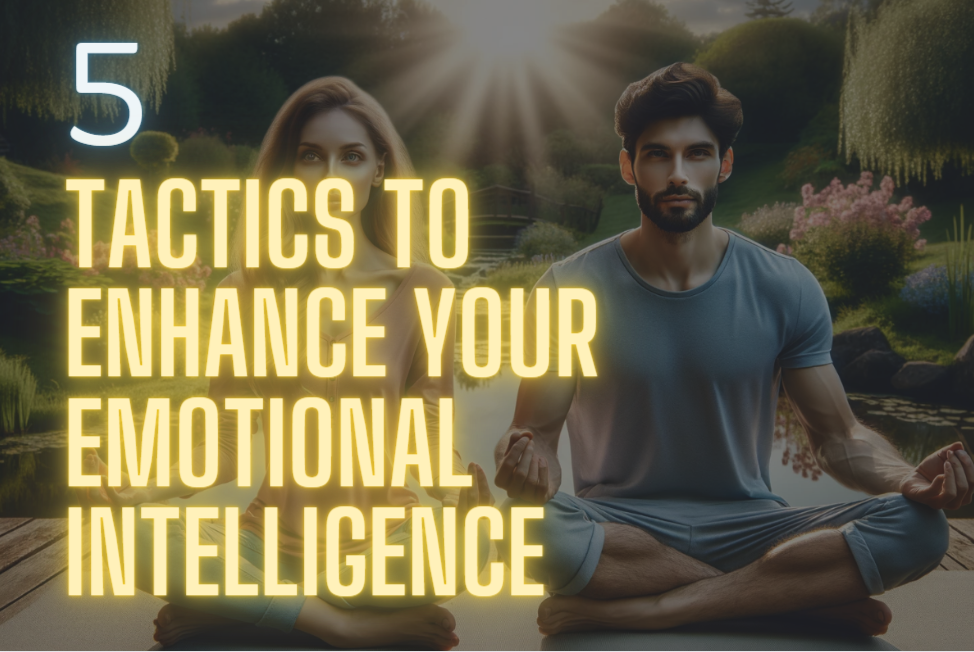Introduct ion
ion
You’re here because you want to improve your relationships, right? Well, you’ve hit the jackpot! This article offers five practical tactics to boost your emotional intelligence.
You’ll learn to understand your feelings, regulate your reactions, empathize with others, and enhance your social skills.
Let’s dive in and you’ll soon be applying these skills to transform your everyday life.
You’re not just reading an article, you’re starting a journey towards healthier, happier relationships.
Understanding Emotional Intelligence
In the realm of effective communication, understanding emotional intelligence is your key to fostering healthier and more fulfilling relationships.
You see, it’s not just about being smart or having a high IQ. It’s about being aware of your own emotions, and the emotions of others. It’s about understanding how these emotions drive behavior.
You’ve got to recognize and empathize with others’ feelings, effectively manage your own emotions, and use this information to navigate social interactions smoothly.
Enhancing your emotional intelligence isn’t a walk in the park – it requires conscious effort, practice, and, oftentimes, a shift in mindset. But trust me, the payoff is worth it.
Strong emotional intelligence can transform your relationships, both personal and professional, leading to greater satisfaction and success.
Self-awareness and Self-regulation
To boost your emotional intelligence, you’ll first need to master self-awareness and self-regulation, two fundamental pillars of emotional understanding.
Self-awareness involves recognizing your own emotions and how they impact your thoughts and actions. It’s about understanding your strengths and weaknesses, and having a strong sense of self-confidence.
Self-regulation, on the other hand, is about managing your emotions in healthy ways, taking initiative, following through on commitments, and adapting to changing circumstances. You can’t control everything that happens to you, but you can control how you react.
Harnessing Empathy for Others
After mastering self-awareness and self-regulation, your next step should be developing empathy—a powerful tool for understanding and sharing the feelings of others. It’s about stepping into someone else’s shoes, feeling their emotions, and seeing things from their perspective. This doesn’t mean you have to agree with their viewpoint, but it does require you to suspend judgment.
Practicing empathy can help you connect with others on a deeper level, fostering stronger relationships. Try to actively listen, validate their feelings, and offer comfort. You’ll find that empathy not only transforms your relationships but also enriches your own emotional intelligence.
You’ll feel more attuned to those around you, creating a more harmonious and understanding environment.
Improving Social Skills
Building on your newfound empathy skills, the next area you’ll want to focus on is honing your social skills, a critical component for boosting your emotional intelligence and fostering healthier relationships.
This involves actively listening, effectively communicating your thoughts and feelings, and understanding non-verbal cues. It’s not about being the life of the party, but about being present, engaged, and responsive in your interactions.
Practice makes perfect, so try stepping out of your comfort zone and engage with different people. Listen more than you speak, and when you do, be clear and concise. Recognize body language and respond accordingly.
Applying EI in Everyday Life
Harnessing your improved social skills, you’re now ready to start incorporating emotional intelligence into your daily life. Start by practicing empathy; put yourself in others’ shoes and try to understand their perspectives. You’ll notice that it’s easier to connect with people and resolve conflicts.
Secondly, manage your emotions effectively. Don’t let anger or frustration control your actions. Instead, keep calm and think before you react.
Thirdly, maintain a positive outlook. Optimism can greatly influence your EI and improve your relationships.
Lastly, don’t forget to self-reflect. Understand your strengths and weaknesses and aim to improve. Remember, emotional intelligence isn’t just about understanding others, it’s about understanding yourself too.
Practice these tactics daily and you’ll see a noticeable change in your relationships.
FAQs
- Can Emotional Intelligence be learned or improved? Absolutely! Unlike IQ, which remains relatively fixed throughout life, EI can be developed and enhanced at any age. It involves learning how to gain control over your emotions and improve your social skills.
- What are the key components of Emotional Intelligence? The key components include self-awareness, self-regulation, motivation, empathy, and social skills.
- How can I improve my self-awareness? Keep a journal, seek feedback from others, and practice mindfulness to become more aware of your emotions and reactions.
- What are some strategies for better self-regulation? Techniques include practicing stress management, being mindful of your emotional reactions, and responding to situations rather than reacting impulsively.
- How can I enhance my empathy? Active listening, paying attention to body language, and putting yourself in others’ shoes are effective ways to enhance empathy.
- What role does motivation play in Emotional Intelligence? Motivation in EI context refers to being driven to achieve for the sake of achievement. It’s a key factor in setting and achieving personal and professional goals.
- How can I improve my social skills? Improving social skills involves improving communication abilities, learning how to manage conflicts, and understanding how to build and maintain relationships.
Conclusion
So, you’ve learned about emotional intelligence and its impact on relationships. You now understand the importance of self-awareness, self-regulation, empathy, social skills, and their application in daily life.
Remember, it’s a journey. Practice these tactics regularly. Be patient with yourself and others. Over time, you’ll see a remarkable improvement in your relationships and personal growth.
Because, enhancing your emotional intelligence isn’t just advantageous, it’s crucial. So, go ahead, start your EI journey today.




